Statement at the High-level luncheon hosted by the President of the General Assembly and UN-DESA titled “In search for water energy nexus: SDG 6 and SDG 7 Synergy
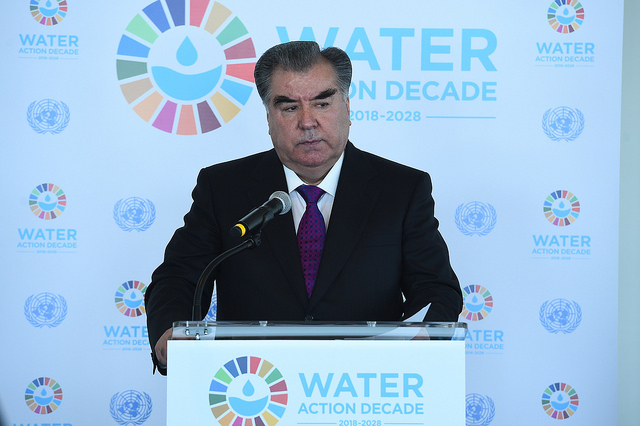
23.03.2018, United States
Mr. Vice-President of the General Assembly,
Mr. Under-Secretary General,
I at the outset wish to extend my sincere appreciation to you for the organization and hosting today’s event on water and energy nexus.
Tajikistan in every possible way supports an idea of seeking water energy nexus and is willing to build strong cooperation with all stakeholders in promoting the best solutions in water and energy sector.
We do believe that hydropower continues to be an important driving element for socio-economic development in many countries.
As of Tajikistan, a country where almost 95 percent of electricity is produced by hydroelectric power stations, there is a visible and undeniable interconnection between these two major factors of sustainable development.
Tajikistan annually produces about 18 billion kWh of electricity, which is only 3 – 4% of the existing potential of the country estimated at 527 billion kWh of electricity per year.
Based on aggregate potential reserves of hydropower resources, Tajikistan ranks as the eighth country in the world and in terms of specific (indicator) energy output per capita – is ranked the second.
It should also be noted that water supply of several sectors of the national economy depends on the availability of electricity.
Given a nexus or I would say interdependence of the two sectors, and with a view to improving public administration, we in May 2013 combined both sectors into one authority – the Ministry of Energy and Water Resources of Tajikistan, which handles the issues of an promotion of integrated and basin water management.
Ladies and gentlemen,
Being endowed with tremendous water resources and immense hydropower potential, Republic of Tajikistan continuously declares its willingness to cooperate with all interested parties, and first of all, with neighboring countries, on efficient, mutually beneficial and rational use of water and energy resources in the interests of all countries of the region.
Shared exploration of this enormous potential would contribute to the comprehensive solution of a number of socio-economic and environmental challenges the Central Asia is facing.
First of all, it is to need of ensuring water security and guaranteed water supply for irrigation of lands in all Central Asian countries in droughty season (year) through construction of reservoirs that allow regulate river runoff in long-run and short term seasons.
Reservoirs may serve to prevent such disastrous hydro-meteorological phenomena as floods, mudflows and inundations.
Second, exploration of an immense hydropower potential of Tajikistan would enable (allow) to provide the region with affordable and environmentally friendly electricity, thus helping to the achievement of SDG-7 in the region.
Third, development of the country’s hydropower resources will likewise contribute to a significant reduction in CO2 emissions into the air.
To conclude, I wish to express hope that today’s event will be yet another milestone meeting advancing review of water and energy nexus, as well as help to draft specific recommendations on an integrated, effective and sustainable development of natural resources.
I thank you!











 Congratulatory Message of His Excellency Emomali Rahmon, President of the Republic of Tajikistan, on the 33rd Anniversary of the Armed Forces
Congratulatory Message of His Excellency Emomali Rahmon, President of the Republic of Tajikistan, on the 33rd Anniversary of the Armed Forces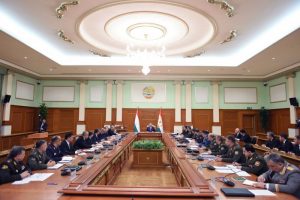 President Emomali Rahmon Holds Security Council meeting
President Emomali Rahmon Holds Security Council meeting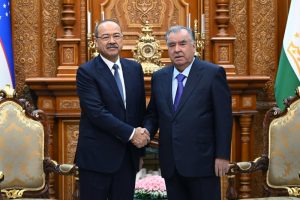 President Emomali Rahmon Receives the Prime Minister of the Republic of Uzbekistan Abdulla Aripov
President Emomali Rahmon Receives the Prime Minister of the Republic of Uzbekistan Abdulla Aripov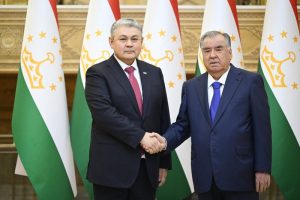 President Emomali Rahmon, Received the Minister of Foreign Affairs of the Republic of Kazakhstan
President Emomali Rahmon, Received the Minister of Foreign Affairs of the Republic of Kazakhstan President Emomali Rahmon Enacts New Laws
President Emomali Rahmon Enacts New Laws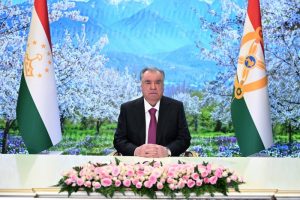 President Emomali Rahmon Sends Festive Greetings to President Xi for Chinese New Year
President Emomali Rahmon Sends Festive Greetings to President Xi for Chinese New Year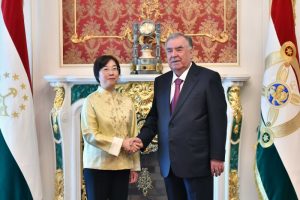 President Emomali Rahmon Receives AIIB President Zou Jiayi in Dushanbe
President Emomali Rahmon Receives AIIB President Zou Jiayi in Dushanbe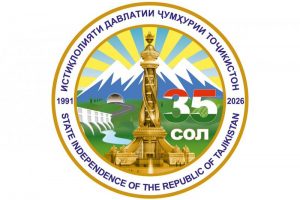 President Emomali Rahmon Approves Emblem for the 35th Anniversary of Tajikistan’s State Independence
President Emomali Rahmon Approves Emblem for the 35th Anniversary of Tajikistan’s State Independence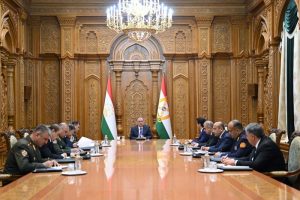 President Emomali Rahmon Holds Working Meeting with Heads of Security and Law Enforcement Agencies
President Emomali Rahmon Holds Working Meeting with Heads of Security and Law Enforcement Agencies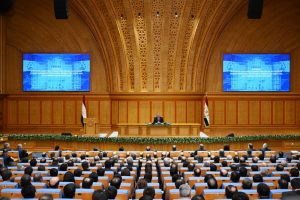 Expanded meeting of the Government of the Republic of Tajikistan
Expanded meeting of the Government of the Republic of Tajikistan














